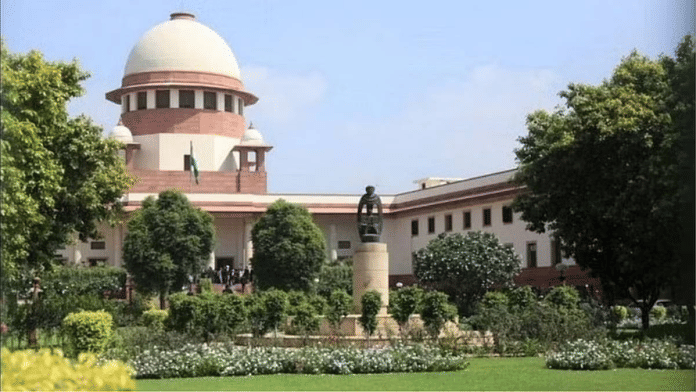New Delhi: Reiterating that liberty should not be curtailed unless bail conditions are violated, the Supreme Court Monday restored the release of five Rashtriya Swayamsevak Sangh (RSS) workers accused of murdering SDPI leader K.S. Shan in Kerala in 2021, nearly two years after the Kerala High Court had sent them back to jail.
A bench of Justices Dipankar Datta and A.G. Masih stressed “bail is the rule, jail the exception”, and said the trial will take time to conclude.
The court described them as “political activists of a particular political organisation (not a party to these proceedings)”.
Shan, the then state secretary of SDPI and who was also a Popular Front of India (PFI) leader, was brutally murdered on 18 December 2021 while returning home on his motorcycle. The attack, allegedly carried out by RSS workers, was said to be a retaliatory act following the killing of an RSS worker, allegedly by SDPI activists.
The accused—Abhimanue, Athul, Sanand, Vishnu and Dhaneesh—were arrested and charged under Sections 120-B (criminal conspiracy) and 302 (murder) of the erstwhile IPC.
Kerala High Court revoked bail in 2024
In December 2022, the sessions court granted bail to all ten accused after nearly a year in custody. However, on 11 December 2024, the Kerala High Court had set aside the bail of five accused, while upholding it for the remaining five.
Justice Bechu Kurian Thomas of the Kerala High Court had then held that the trial court had acted mechanically, granting bail without proper consideration of the seriousness of the charges. The Kerala government had moved the High Court, arguing that the release of the accused could result in witness intimidation and evidence tampering.
Supreme Court’s intervention
The top court heard the appeals against the high court’s revocation order. On 22 September, in a 15-page judgement, the apex court set aside the HC’s order and restored the bail of the five men. The SC emphasised that they had already been on bail for nearly two years before the HC’s intervention and that “taking them back into custody should not operate to their prejudice” more so, “when two years have passed in the interregnum”.
The bench also clarified the distinction between cancellation and revocation of bail.
“Law is well settled that cancellation of bail is distinct from revocation of an order granting bail. Bail may be cancelled when the accused violates any of the conditions imposed. On the other hand, an order granting bail can be revoked if such an order is found to be perverse or illegal,” the SC said.
On criminal antecedents and alleged violation
The Kerala government argued that one of the accused, Vishnu, had violated interim bail (granted by SC on 28 May 2025) conditions by assaulting a man named Abhiram. The Supreme Court, however, rejected this as a ground for cancellation, pointing out that Abhiram himself had filed an affidavit before the HC denying Vishnu’s involvement. The SC noted that “Abhiram also denied having settled the dispute” and clarified that “upon conciliation talks only the misunderstanding was mitigated”.
“There is more than what meets the eyes. We are not prepared to accept the contention that the FIR lodged by Abhiram affords ground for cancellation of bail granted to Vishnu,” the order stated.
On the State’s contention that the accused had multiple criminal antecedents, the bench said: “Suffice it to say, however, that such antecedents by themselves cannot constitute a ground for denial of bail.”
The court relied on the precedent in Ayub Khan v. State of Rajasthan, passed with Justice Masih a member, where the bench allowed bail despite antecedents, depending on the peculiar facts of a case.
‘Bail is the rule, jail the exception’
Reiterating Justice Krishna Iyer’s doctrine, the bench underscored: “The golden rule of bail being the rule and jail an exception cannot be ignored.” It added that: “Indeed, if such accused are likely to interfere with witness testimony, the courts could be justified in ordering the accused to be taken back into custody.”
The court also took note of the scale of the trial. With 141 witnesses yet to be examined, the judges observed, “The trial will obviously take time to conclude. Bearing in mind that the appellants since grant of bail have not been involved in any similar or other offence, we prefer to lean in favour of liberty rather than its curtailment.”
Imposing bail conditions and balancing ‘liberty and justice’
While restoring bail, the Supreme Court imposed strict conditions to balance the liberty of the accused with the integrity of the trial—which include geographical restrictions, police attendance, no witness interference, trial cooperation and a crucial monitoring mechanism.
The court added that the accused could seek modification of attendance conditions after the examination of key eye witnesses.
The bench acknowledged the HC’s criticism of the sessions court’s “mechanical” approach in granting bail. But it concluded that liberty could still be safeguarded through restrictions rather than continued incarceration.
“The likelihood of the accused influencing the witnesses or tampering with the evidence and ensuring smooth progress of the trial could have been taken care of by imposing stringent conditions,” Justice Datta said in the judgment.
The court also urged the trial court to expedite proceedings and directed the State to ensure the presence of all witnesses—both private and official—on scheduled hearing dates.
“We prefer to lean in favour of liberty rather than its curtailment,” the bench said.
(Edited by Gitanjali Das)






